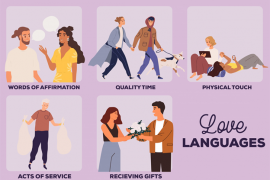The word compromise generally refers to an agreement or settlement of a dispute that is reached by each side making concessions; it could also mean the expedient acceptance of standards that are lower than is desirable.
In relationships, compromise is often viewed as the latter; and statistics have shown that women compromise more often than men do in relationships. This accounts for many problems in relationships, some women go into relationships believing that it is their place to make more compromises. It is important to note that both parties are expected to make some adjustments in order to accommodate each other in every relationship.
In this article, Barton Goldsmith Ph.D. multi-award-winning psychotherapist, syndicated columnist, author, and radio host gives us 10 Reasons to C.O.M.P.R.O.M.I.S.E. in Your Relationship – and he is not referring to women only.
Here is what he says about how to take a relationship from the battlefield to blissful coexistence.
Somewhere in a thesaurus far, far away, there is another word for marriage—and it is “compromise.” Each letter in this word, which has somehow gotten left out of the wedding vows, gives couples direction in how to take a relationship from the battlefield to blissful coexistence.
C – Compromise is something that combines qualities or elements of different things. It does not mean giving up or giving in. It is a blending of hearts and minds, and that is what makes a marriage.
O – Open your heart. Even holding back as little as one percent can make the difference between a loving and a losing relationship.
M – Maximize your willingness. Just being willing to compromise will encourage new ways of relating. The space you create allows you to change in ways you never imagined. Anyone who has ever grown in a relationship will tell you it’s much better than the alternative.
P – Promise is the second half of compromise. It means to communicate your commitment and dedication to the one you love. Do this on a daily basis and you will have a long-lasting and loving relationship.
R – Release your desire for control. Giving up having to be right or getting your way will make your life much easier. In addition, you are actually giving a gift to yourself (and your partner) by releasing any pent-up anger or fear. By holding on to the need to control, you are actually being controlled by your unhealthy emotions.
O – Optimistic couples have longer and healthier lives and relationships than those who are pessimistic. Doing your best to look on the bright side, while knowing that the dark times are almost always temporary, is an attitude that will make dealing with any situation easier.
M – Minimize your defensiveness. When your partner tells you something that you may need to hear, try to listen and consider what he or she has to say before you react. One of the best parts of being in a relationship is having someone there to help you look and be your best.
I – Inspiration is one of the greatest gifts a relationship can offer. Being connected can make you want to be creative and grow in ways you may never have thought of if you were alone.
S – Selflessness gets you more than you could ever want. Giving what you want to receive is the best way to communicate to your partner what it is you desire. You may also find that by giving to your partner, your needs diminish as the love between you grows.
E – Engage with your mate. Rather than trying to ignore or disconnect with the person you love, take a giant step toward him or her. It makes the experience of being in a relationship, as well as your communication, whole.

Compromise is not a hard lesson once you realize the gifts that come from it. Learning to work together will make your relationship and your life a better place to be.




